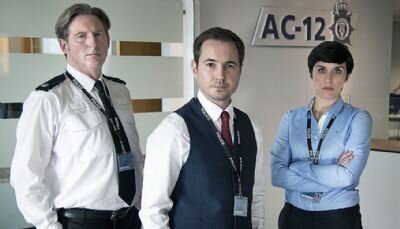| |
|
|
| Tookey's Review |
|
| Pro Reviews |
|
| Mixed Reviews |
|
| Anti Reviews |
|
| Cast |
|
| |
 |
| |
| Released: |
2012 |
| |
|
| Genre: |
DRAMA
SERIES
CRIME
THRILLER
|
| |
|
| Origin: |
UK |
| |
|
| Length: |
0 |
|
| |
|
| |
|
|
| |
|
|
Detective Sergeant Steve Arnott (Martin Compston, pictured centre) is a detective sergeant assigned to AC-12, the anti-corruption unit within Central Police, run by Superintendent Ted Hastings (Adrian Dunbar, pictured left).
|
Reviewed by Chris Tookey
|
Line of Duty is a BBC police procedural television series created by Jed Mercurio. It is notable for many things, but principally the depth and complexity of the chief suspects. These are played by Lennie James (series 1), Keeley Hawes (series 2-3), Daniel Mays (series 3) and Thandie Newton (series 4). Other members of the police force with less than scrupulous morals are played by Craig Parkinson, Polly Walker and Neil Morrissey. Vicky McClure (pictured right) also excels as Detective Constable Kate Fleming, who specialises in undercover work, which often leads her into morally equivocal situations.
Martin Compston plays Steve Arnott with a terrier-like tenacity, so that - although he is grumpy, spiky and resentful of others’ success - he is at least admirable for his doggedness. Adrian Dunbar is superb as his commanding officer, having to cope with political pressures, wobbly scruples and a failing marriage but keen not to stand in the way of justice. We’re so used in American drama to the idiot police chief, that it’s a relief to find one here who’s not only highly competent but also bends over backwards to support his subordinates.
Although the police department is fictitious, the series has its finger on the pulse of modern policing, with wickedly accurate jibes at the expense of political correctness and the “target” mentality of high command. Some of the more outlandish action sequences border on the silly, but they have the saving merit of being genuinely exciting. Afterwards, we are always pulled back in by the realism of the acting. For my money, the wonderfully nuanced, deliberately opaque performances by Keeley Hawes and Thandie Newton would be worth the price of the licence fee by themselves.
Rarely has the line between right and wrong been so expertly blurred. Miraculously, the four series have grown in ingenuity as they have gone on, and there have been wonderful instances of unexpected character progression, as seemingly familiar personnel have developed in pleasingly - and dismayingly - unpredictable ways. There is every reason to look forward to series 5.
|
|
|
|
